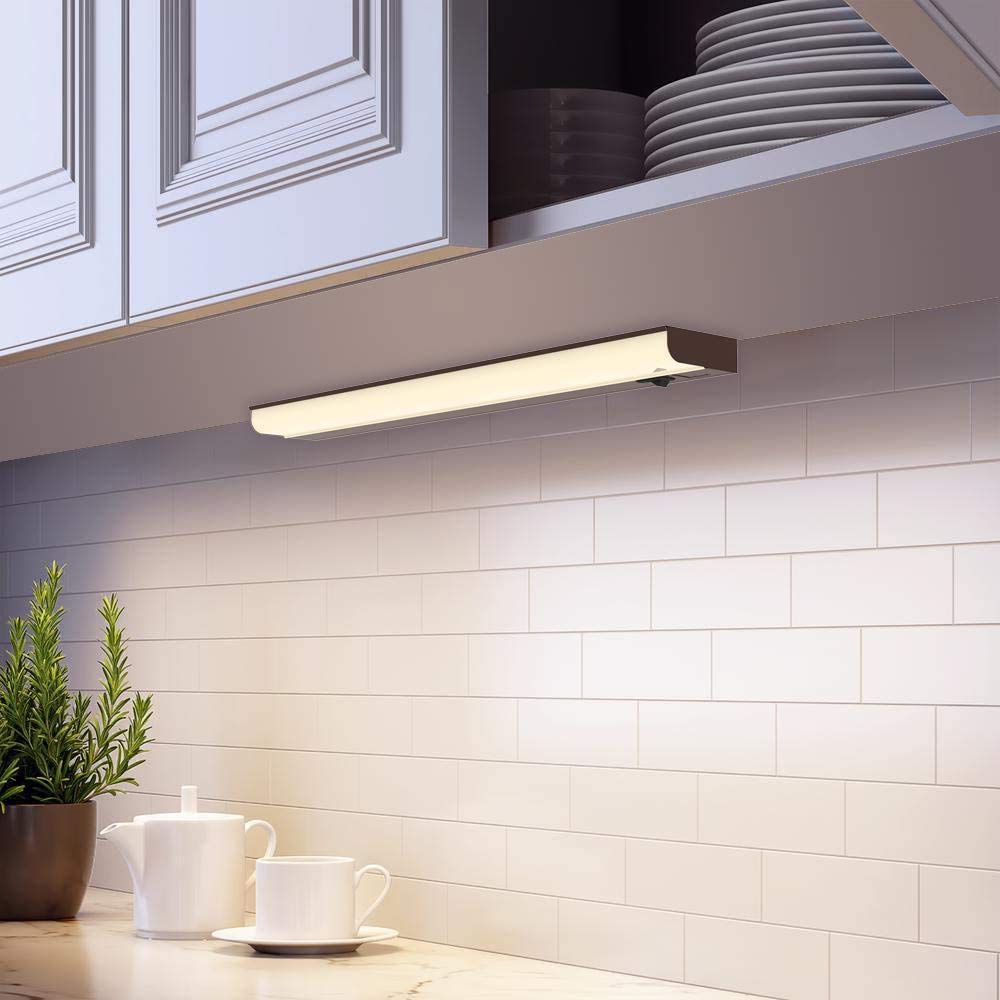Introduction to Under Cabinet Lighting
How to hide under cabinet lighting wires? Transform your kitchen’s functionality and style with under cabinet lighting. It’s more than just illumination; it enhances your space’s look and feel.
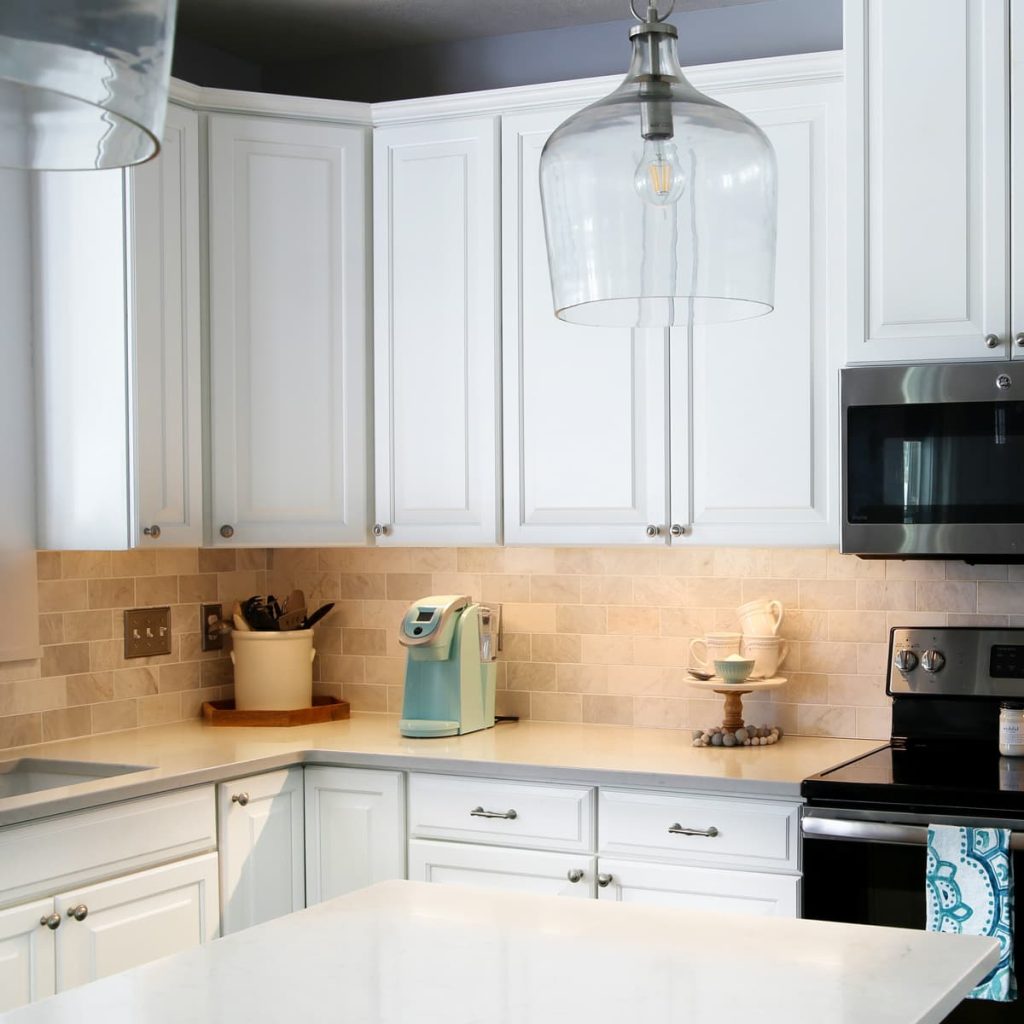
The Importance of Under Cabinet Lighting
Well-placed under cabinet lights create a warm ambiance and improve your kitchen work area’s visibility.
Types of Under Cabinet Lighting
Choosing the right type can make all the difference. LED light strips, light bars, and puck lights are popular choices for under cabinet lighting.
Planning Your Installation
In planning the installation for under cabinet lighting, three vital steps ensure both aesthetics and safety.
Assessing Your Kitchen Layout
Start by examining your kitchen’s layout. Identify areas in need of light. Consider cabinet size and wall space. This helps determine wire placement and fixture types.
Choosing the Right Lighting Fixtures
Select fixtures matching your needs. LEDs are efficient and slim for easier hiding of wires. Puck lights add focused accents. Bars offer even lighting.
Understanding Electrical Safety Precautions
Safety is critical. Learn about your home’s wiring. Always turn off electricity before starting. Ensure all tools and equipment meet safety standards. Follow local codes for electrical installations.
Hiding Wiring: Various Methods
Concealing wires is key for a sleek kitchen look. Here’s how to do it.
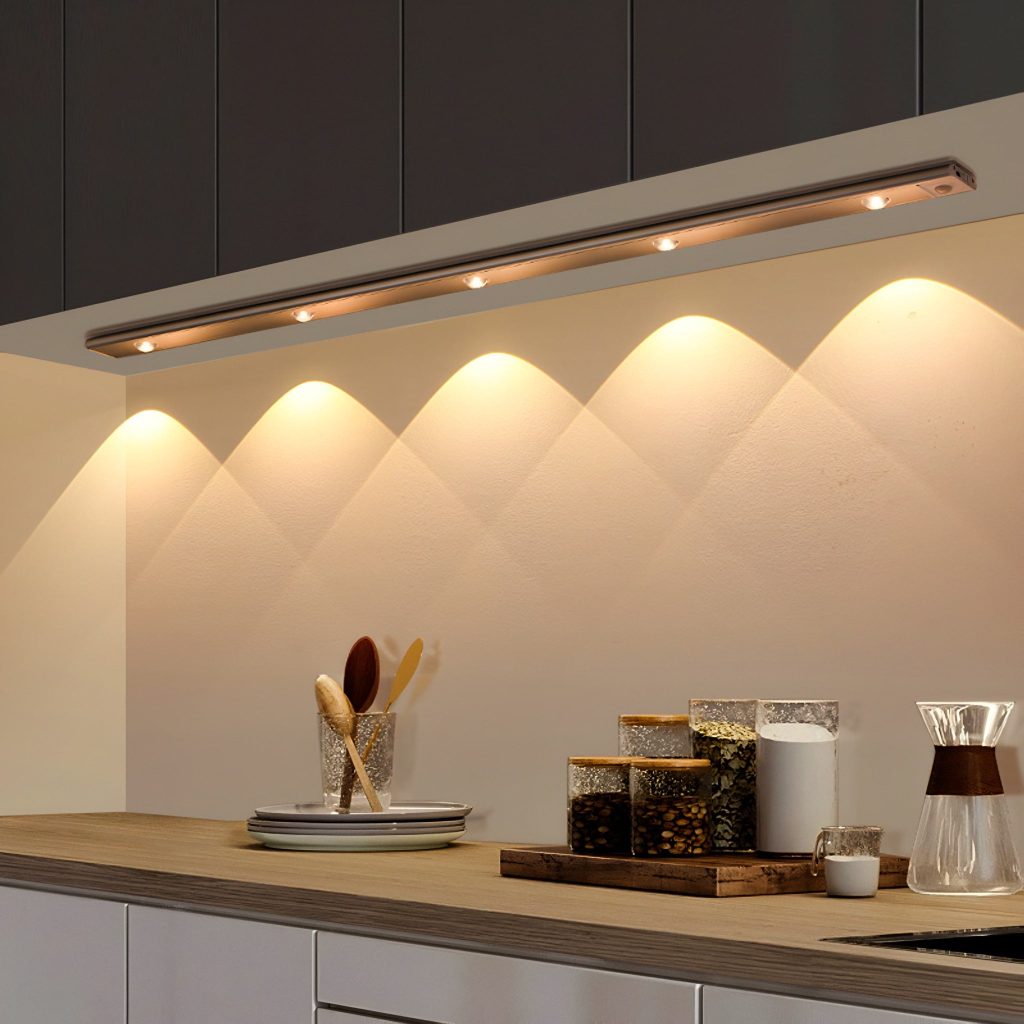
Using Raceways or Wire Channels
Raceways or wire channels are excellent for hiding wires. You attach them under cabinets and paint to match.
Installing a Wiring Lightbox
A lightbox inside cabinets keeps wires out of sight. It’s a clean looking solution.
Adding a Wire Molding or Valance
Wire moldings or valances can add style while hiding wires. They attach under cabinets, blending with your decor.
Running Wires Behind the Wall
For a seamless look, run wires behind the wall. It’s best done when installing new cabinets.
DIY Installation Tips
Tools and Materials Needed
Before embarking on your under cabinet lighting project, gather the necessary tools and materials. You will need:
- Screwdrivers and wire strippers for electrical work.
- Raceways, wire channels, or valance to hide wires.
- Lightbox, if you choose to install one within the cabinet.
- Adhesive clips, should you prefer this wire-hiding method.
- Paint or wood stain to match the raceways or valance to your cabinets.
- Drill with appropriate bits for running wires or installing fixtures.
- Cable clips for securing wires neatly.
Ensure you have these items ready to streamline the installation process.
Step-by-Step Installation Process
To install and conceal your under cabinet lighting wires effectively, follow these steps:
- Turn off power at the circuit breaker to ensure safety.
- Place and secure the lighting fixtures under the cabinets as planned.
- Use raceways or wire channels along the cabinet’s underside; clip the wires inside.
- Install a valance or lightbox if needed to conceal any visible wiring.
- Run wires behind the wall for a seamless look, if applicable to your situation.
- Paint or stain raceways and valances to match your cabinet’s finish.
- Turn the power back on and test the lighting to verify proper installation.
Safety Checks Post-Installation
After installation, conduct these important safety checks:
- Confirm that all wiring conforms to local building codes.
- Check that the raceways or channels are securely attached and wires are not pinched.
- Ensure every electrical connection is tight and secure to prevent any potential hazards.
- Test the lighting system’s function, and look for any issues in operation.
By diligently following these steps and performing safety checks, you will create a well-lit and aesthetically pleasing kitchen space free of exposed wiring.
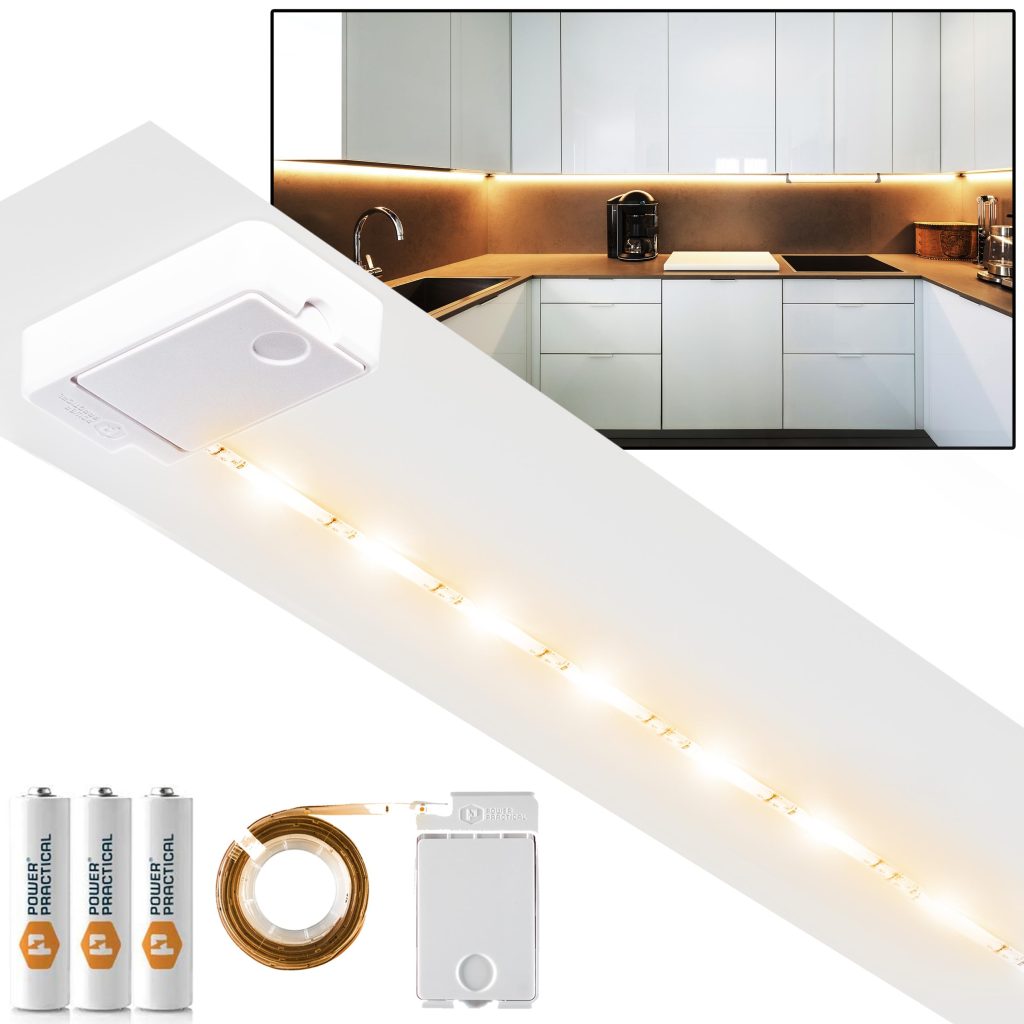
Wire Management Products
Incorporating wire management products is essential for a professional finish in kitchen design.
Introduction to Cable Management Boxes
Cable management boxes serve as a storage solution for excessive wiring. They are designed to encase and protect wires, keeping them organized and out of sight.
The Role of Cable Protectors and Covers
Cable protectors and covers ensure wires are securely hidden. They prevent tripping hazards and contribute to a cleaner aesthetic. Suitable for wires that run along surfaces or floors.
Adhesive Clips and Their Uses
Adhesive clips offer a simple, tool-free method to manage wires. They stick firmly to surfaces, securing wires neatly under cabinets and along walls.
Professional vs. DIY Installations
When approaching the task of installing under cabinet lighting, the decision between a DIY approach and hiring a professional can be crucial.
When to Consider Hiring a Professional
Hiring a professional is advisable if:
- The installation process is complex or involves extensive electrical work.
- You lack the necessary skills or tools.
- Ensuring that the installation adheres to all local building codes is a priority.
- You value having a warranty or guarantee for the work performed.
By opting for a professional, you may avoid potential hazards and ensure that the project is completed efficiently and to a high standard.
Understanding the Expenses Involved
The cost of professional installation can vary widely based on several factors:
- The complexity of your under cabinet lighting setup.
- The hourly rate or fixed price charged by the electrician or installation service.
- The cost of additional materials or wire management products needed.
- Whether any unexpectedly extensive adjustments are necessary during the installation process.
While professional services incur costs, they can provide peace of mind, especially in complex or high-end kitchen designs where precision and expertise are paramount.
Maintaining Aesthetic Appeal
Maintaining the aesthetic appeal of your kitchen while installing under cabinet lighting is crucial. Creative wire concealment maintains the design integrity of your space. Hidden wires ensure the lighting highlights your kitchen’s features without the distraction of visible wires.
Matching Decor and Concealment Tactics
To match your decor, choose concealment tactics that blend seamlessly with your kitchen’s design. Raceways and wire channels can be painted to match cabinetry. Use wire moldings or valances that complement your decor in style and color. When selecting adhesive clips, opt for colors that blend with your cabinetry or the underside of your cabinets to maintain the visual flow.
Reviewing Kitchen Aesthetic and Functionality Goals
Regularly review your kitchen’s aesthetic and functionality goals. Ensure that your wire concealment methods align with these goals. The lighting should enhance functionality without compromising the style. Evaluate if the under cabinet lighting and wire hiding techniques improve your workspace while adding to the overall beauty of your kitchen. Aim for a balance that meets practical needs and design preferences.
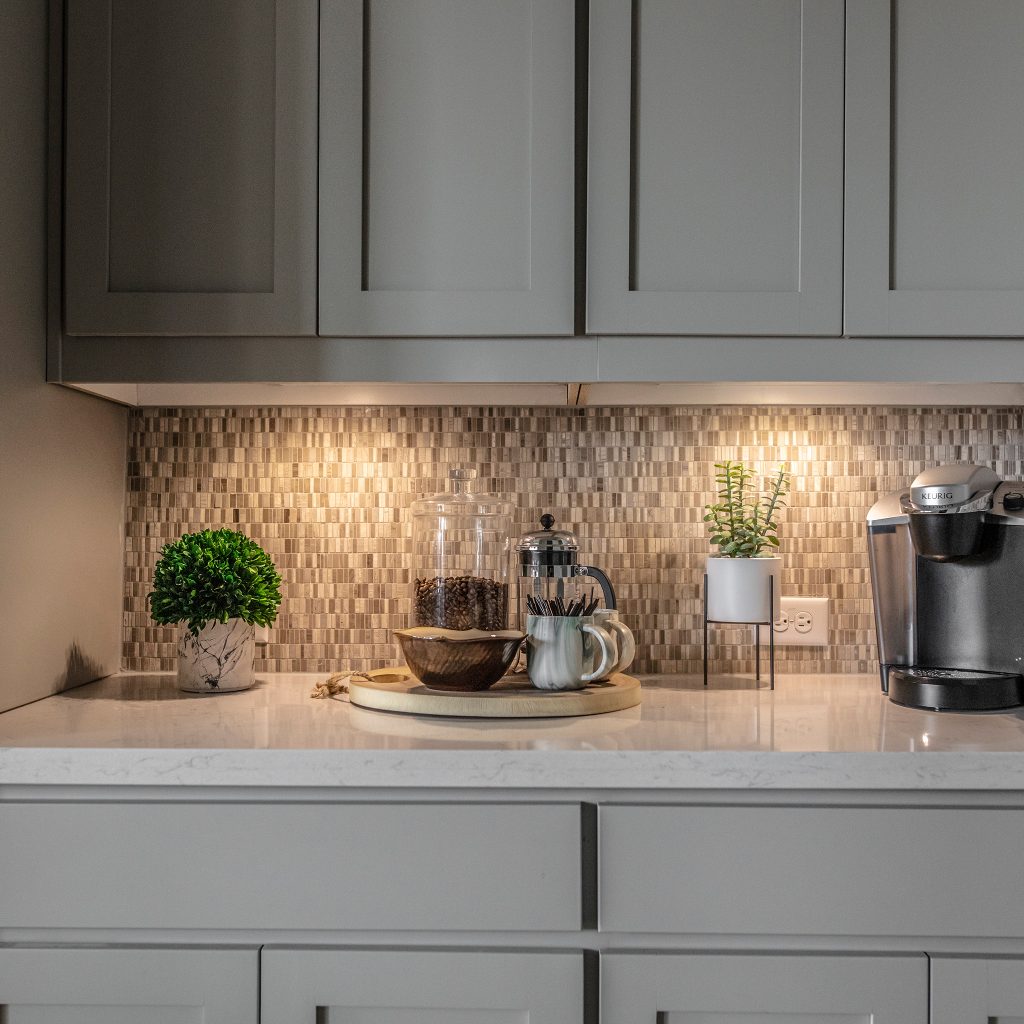
Conclusion
As we wrap up our guide on how to hide under cabinet lighting wires, let’s recap the methods covered to ensure a polished look in your kitchen. Using raceways or wire channels, installing a lightbox, adding a molding or valance, and running wires behind the wall are effective solutions. Each method helps achieve a clutter-free and visually pleasing space.
Review of Methods to Hide Wires
To summarize, the methods to conceal wires include:
- Attaching raceways or channels under cabinets.
- Using a lightbox to enclose wires inside the cabinet.
- Adding a decorative wire molding or valance.
- Running wires behind walls, especially during new installations.
Emphasizing the Importance of Aesthetics and Safety
Aesthetics are crucial in kitchen design, and hiding wires maintains a tidy look. Safety is equally important; always adhere to electrical codes and turn off power during installation. Remember, the goal is to enhance your kitchen’s functionality and style safely and attractively.
By following this guide, your under cabinet lighting will not only be functional but also contribute to the overall beauty of your kitchen without any unsightly wires in view.
